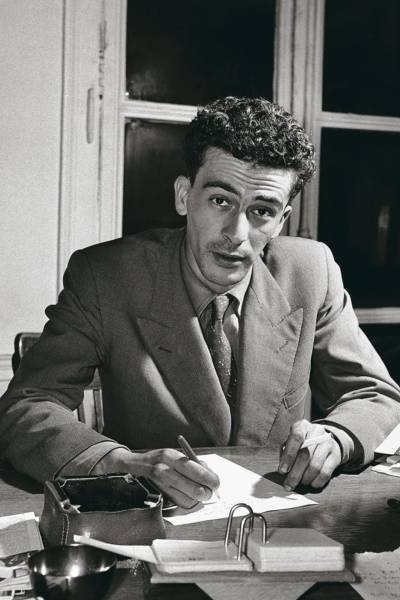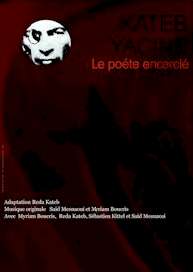Fiche Personne
Théâtre
Cinéma/TV
Littérature / édition
Yacine Kateb, plus connu sous son nom de plume Kateb Yacine, né le 2 août 1929 à Constantine, en Algérie, et mort le 28 octobre 1989 à Grenoble, en France, est un écrivain, poète, romancier, dramaturge, metteur en scène, essayiste et journaliste algérien, originaire des Aurès, en Algérie.
Rebelle à tous les pouvoirs, pourfendeur du colonialisme, de l'impérialisme et de tous les intégrismes, Kateb Yacine est mort en France d'une leucémie, avant que l'Algérie ne sombre dans le sang. La violence et la mort, d'une autre époque, sont à l'origine de son œuvre. Le 8 mai 1949, à Sétif, la manifestation contre le colonialisme dégénère, Kateb Yacine se retrouve, à 20 ans, sous des monceaux de cadavres : l'armée française et la police sont responsables de dizaines de milliers de morts, 40.000 selon certains.
Emprisonné, Kateb apprendra que quatorze membres de sa famille ont été abattus et que sa mère, le croyant mort, est devenue folle. La violence et la mort, d'une époque à l'autre, se perpétuent bel et bien. "Tout est sorti de la prison et de l'amour, les deux sources de l'œuvre." Kateb Yacine a toujours mis le doigt sur les plaies. Il voulait transformer le monde. "Je suis Algérien par mes ancêtres, internationaliste par mon siècle". "Ni musulman, ni arabe, mais algérien". Au cœur de l'histoire de l'Algérie et de ses convulsions, l'œuvre de Kateb Yacine reste d'une actualité brûlante. De son vrai nom Mohammed Khellouti, issu d'une vieille tribu de lettrés, il s'est choisi Kateb – "écrivain" en arabe – et avec : par ironie, Yacine, parce que l'administration coloniale appelait les indigènes par leur patronyme suivi de leur prénom.
Poète, romancier, auteur dramatique, Kateb Yacine utilise la langue comme une arme. Ses romans, Nedjma, Le Polygone étoilé sont considérés comme fondateurs de la littérature algérienne moderne. Fragments, bourgeonnements, variantes, éclatement de la narration traditionnelle, ils déroutent par leur structure innovante (fin des années 50) et par leur densité poétique. Livres énigmatiques et emblématiques où l'Algérie mythique rejoint l'Algérie contemporaine. La trahison des pères est l'origine de l'errance.
https://data.bnf.fr/fr/11930322/yacine_kateb/
Kateb Yacine
Ecrivain/ne, Dramaturge
(Homme)
Algérie
Français
Yacine Kateb, plus connu sous son nom de plume Kateb Yacine, né le 2 août 1929 à Constantine, en Algérie, et mort le 28 octobre 1989 à Grenoble, en France, est un écrivain, poète, romancier, dramaturge, metteur en scène, essayiste et journaliste algérien, originaire des Aurès, en Algérie.
Rebelle à tous les pouvoirs, pourfendeur du colonialisme, de l'impérialisme et de tous les intégrismes, Kateb Yacine est mort en France d'une leucémie, avant que l'Algérie ne sombre dans le sang. La violence et la mort, d'une autre époque, sont à l'origine de son œuvre. Le 8 mai 1949, à Sétif, la manifestation contre le colonialisme dégénère, Kateb Yacine se retrouve, à 20 ans, sous des monceaux de cadavres : l'armée française et la police sont responsables de dizaines de milliers de morts, 40.000 selon certains.
Emprisonné, Kateb apprendra que quatorze membres de sa famille ont été abattus et que sa mère, le croyant mort, est devenue folle. La violence et la mort, d'une époque à l'autre, se perpétuent bel et bien. "Tout est sorti de la prison et de l'amour, les deux sources de l'œuvre." Kateb Yacine a toujours mis le doigt sur les plaies. Il voulait transformer le monde. "Je suis Algérien par mes ancêtres, internationaliste par mon siècle". "Ni musulman, ni arabe, mais algérien". Au cœur de l'histoire de l'Algérie et de ses convulsions, l'œuvre de Kateb Yacine reste d'une actualité brûlante. De son vrai nom Mohammed Khellouti, issu d'une vieille tribu de lettrés, il s'est choisi Kateb – "écrivain" en arabe – et avec : par ironie, Yacine, parce que l'administration coloniale appelait les indigènes par leur patronyme suivi de leur prénom.
Poète, romancier, auteur dramatique, Kateb Yacine utilise la langue comme une arme. Ses romans, Nedjma, Le Polygone étoilé sont considérés comme fondateurs de la littérature algérienne moderne. Fragments, bourgeonnements, variantes, éclatement de la narration traditionnelle, ils déroutent par leur structure innovante (fin des années 50) et par leur densité poétique. Livres énigmatiques et emblématiques où l'Algérie mythique rejoint l'Algérie contemporaine. La trahison des pères est l'origine de l'errance.
https://data.bnf.fr/fr/11930322/yacine_kateb/
English
Yacine Kateb, better known by his pen name Kateb Yacine, born August 2, 1929 in Constantine, Algeria, and died October 28, 1989 in Grenoble, France, is a writer, poet, novelist, playwright, director, Algerian essayist and journalist, originally from Aurès, Algeria.
Rebel against all powers, slayer of colonialism, imperialism and all fundamentalisms, Kateb Yacine died in France of leukemia, before Algeria fell into bloodshed. Violence and death, from another era, are at the origin of his work. On May 8, 1949, in Sétif, the demonstration against colonialism degenerated, Kateb Yacine found himself, at the age of 20, under piles of corpses: the French army and the police were responsible for tens of thousands of deaths, 40,000 according to some.
Imprisoned, Kateb will learn that fourteen members of his family have been shot and that his mother, believing him dead, has gone crazy. Violence and death, from one era to another, are indeed perpetuated. “Everything came out of prison and love, the two sources of the work.” Kateb Yacine has always put his finger on the wounds. He wanted to transform the world. “I am Algerian by my ancestors, internationalist by my century”. “Neither Muslim, nor Arab, but Algerian.” At the heart of the history of Algeria and its convulsions, the work of Kateb Yacine remains burning today. His real name is Mohammed Khellouti, from an old tribe of scholars, he chose Kateb – "writer" in Arabic – and with: ironically, Yacine, because the colonial administration called the natives by their surname followed by of their first name.
Poet, novelist, playwright, Kateb Yacine uses language as a weapon. His novels, Nedjma, Le Polygone étoilé are considered the founders of modern Algerian literature. Fragments, buddings, variants, bursting of traditional narration, they are disconcerting by their innovative structure (late 1950s) and by their poetic density. Enigmatic and emblematic books where mythical Algeria meets contemporary Algeria. The betrayal of the fathers is the origin of wandering.
https://data.bnf.fr/fr/11930322/yacine_kateb/
Rebel against all powers, slayer of colonialism, imperialism and all fundamentalisms, Kateb Yacine died in France of leukemia, before Algeria fell into bloodshed. Violence and death, from another era, are at the origin of his work. On May 8, 1949, in Sétif, the demonstration against colonialism degenerated, Kateb Yacine found himself, at the age of 20, under piles of corpses: the French army and the police were responsible for tens of thousands of deaths, 40,000 according to some.
Imprisoned, Kateb will learn that fourteen members of his family have been shot and that his mother, believing him dead, has gone crazy. Violence and death, from one era to another, are indeed perpetuated. “Everything came out of prison and love, the two sources of the work.” Kateb Yacine has always put his finger on the wounds. He wanted to transform the world. “I am Algerian by my ancestors, internationalist by my century”. “Neither Muslim, nor Arab, but Algerian.” At the heart of the history of Algeria and its convulsions, the work of Kateb Yacine remains burning today. His real name is Mohammed Khellouti, from an old tribe of scholars, he chose Kateb – "writer" in Arabic – and with: ironically, Yacine, because the colonial administration called the natives by their surname followed by of their first name.
Poet, novelist, playwright, Kateb Yacine uses language as a weapon. His novels, Nedjma, Le Polygone étoilé are considered the founders of modern Algerian literature. Fragments, buddings, variants, bursting of traditional narration, they are disconcerting by their innovative structure (late 1950s) and by their poetic density. Enigmatic and emblematic books where mythical Algeria meets contemporary Algeria. The betrayal of the fathers is the origin of wandering.
https://data.bnf.fr/fr/11930322/yacine_kateb/
Films(s)
-
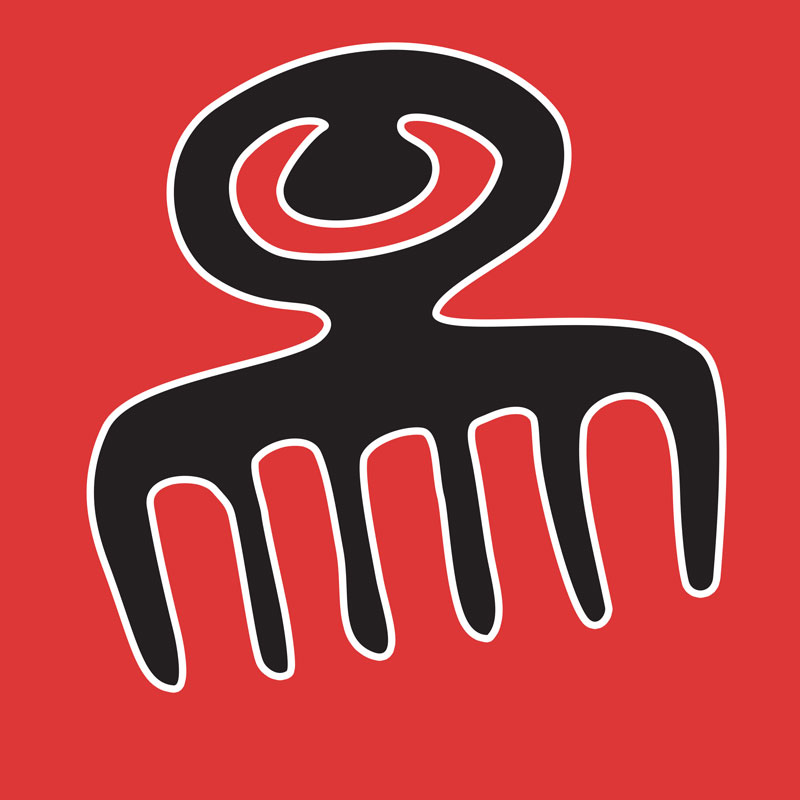 KATEB YACINE, paroles contre l’oubliCourt-métrage – 2002Réalisation : Hadj FITAS documentaire de 14 mn, 1989-2002.Kateb Yacine est lié(e) à ce film en tant que acteur/trice
KATEB YACINE, paroles contre l’oubliCourt-métrage – 2002Réalisation : Hadj FITAS documentaire de 14 mn, 1989-2002.Kateb Yacine est lié(e) à ce film en tant que acteur/trice -
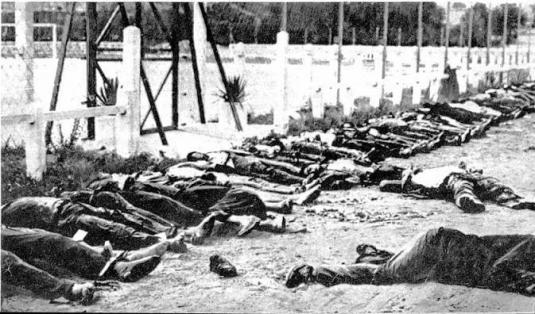 Déjà le sang de Mai ensemençait NovembreLong-métrage – 1987Ce film documentaire a voulu rétablir la vérité sur un certains nombre d’évènements historiques, qui sont, soit escamotés du récit que la France a fait de la colonisation de l’Algérie, soit relatés mais à travers encore …Kateb Yacine est lié(e) à ce film en tant que acteur/trice
Déjà le sang de Mai ensemençait NovembreLong-métrage – 1987Ce film documentaire a voulu rétablir la vérité sur un certains nombre d’évènements historiques, qui sont, soit escamotés du récit que la France a fait de la colonisation de l’Algérie, soit relatés mais à travers encore …Kateb Yacine est lié(e) à ce film en tant que acteur/trice -
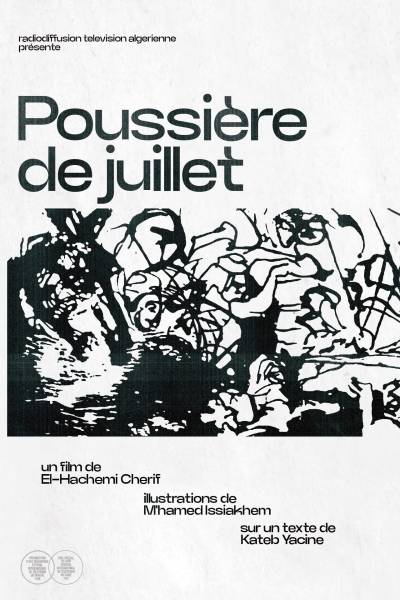 Poussière De JuilletMoyen-métrage – 0"Poussières de Juillet", réalisé en 1967 par Hachemi El-Chérif.est tiré d'un poème de Kateb Yacine. "On avait fait un film sur le retour des cendres de l&rsquo…Kateb Yacine est lié(e) à ce film en tant que scénariste
Poussière De JuilletMoyen-métrage – 0"Poussières de Juillet", réalisé en 1967 par Hachemi El-Chérif.est tiré d'un poème de Kateb Yacine. "On avait fait un film sur le retour des cendres de l&rsquo…Kateb Yacine est lié(e) à ce film en tant que scénariste
Livres(s)
-
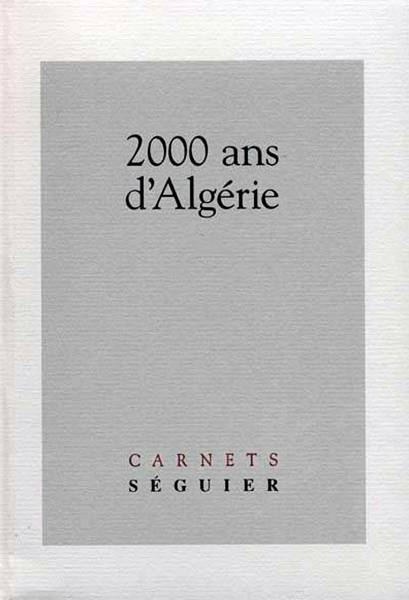 2000 ans d’AlgérieEthnologie, civilisation, anthropologie"2000 ans d'Algérie", en trois tomes parues entre 1998 et 2003, est destiné à replacer l’Algérie dans la matrice de son histoire méditerranéen…Kateb Yacine est lié(e) à ce livre en tant que ecrivain/ne
2000 ans d’AlgérieEthnologie, civilisation, anthropologie"2000 ans d'Algérie", en trois tomes parues entre 1998 et 2003, est destiné à replacer l’Algérie dans la matrice de son histoire méditerranéen…Kateb Yacine est lié(e) à ce livre en tant que ecrivain/ne -
 oeuvre en fragments (L’)RecueilPoèmes, pièces de théâtre et textes narratifs inédits de l’auteur de Nedjma, écrivain majeur de la littérature algérienne. Grand Prix national des Lettres en 1986. Nouvelle éditionKateb Yacine est lié(e) à ce livre en tant que ecrivain/ne
oeuvre en fragments (L’)RecueilPoèmes, pièces de théâtre et textes narratifs inédits de l’auteur de Nedjma, écrivain majeur de la littérature algérienne. Grand Prix national des Lettres en 1986. Nouvelle éditionKateb Yacine est lié(e) à ce livre en tant que ecrivain/ne -
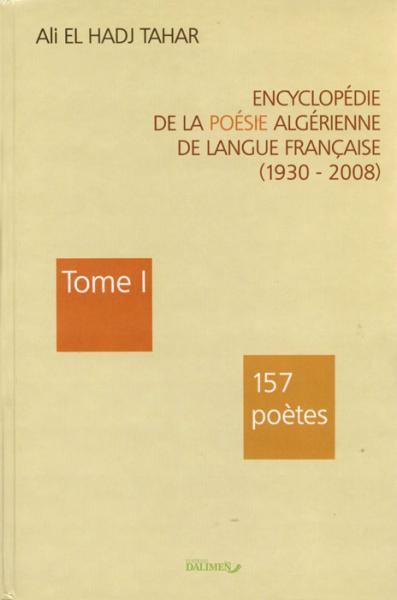 Encyclopédie de la poésie algérienne de langue française, 1930-2008, 157 poètesAnthologieL’Encyclopédie de la poésie algérienne de langue française, 1930-2008 regroupe 157 poètes. En deux tomes, respectivement de 462 pages et 494 pages, elle est précédée d’une introduction de 112 pages. Chaque poèt…Kateb Yacine est lié(e) à ce livre en tant que dramaturge
Encyclopédie de la poésie algérienne de langue française, 1930-2008, 157 poètesAnthologieL’Encyclopédie de la poésie algérienne de langue française, 1930-2008 regroupe 157 poètes. En deux tomes, respectivement de 462 pages et 494 pages, elle est précédée d’une introduction de 112 pages. Chaque poèt…Kateb Yacine est lié(e) à ce livre en tant que dramaturge -
 Kateb Yacine, un théâtre et trois languesBeau livreDans le cadre de l’Année de l’Algérie, de nombreuses manifestations seront consacrées en 2003 à l’oeuvre de Kateb Yacine. Poète, romancier, dramaturge, journaliste, l’homme fut aussi et surtout un inlassable mi…Kateb Yacine est lié(e) à ce livre en tant que dramaturge
Kateb Yacine, un théâtre et trois languesBeau livreDans le cadre de l’Année de l’Algérie, de nombreuses manifestations seront consacrées en 2003 à l’oeuvre de Kateb Yacine. Poète, romancier, dramaturge, journaliste, l’homme fut aussi et surtout un inlassable mi…Kateb Yacine est lié(e) à ce livre en tant que dramaturge -
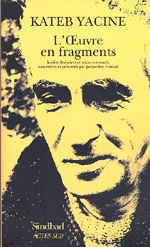 œuvre en fragments (L’)Recueilinédits rassemblés par Jacqueline ArnaudKateb Yacine est lié(e) à ce livre en tant que dramaturge
œuvre en fragments (L’)Recueilinédits rassemblés par Jacqueline ArnaudKateb Yacine est lié(e) à ce livre en tant que dramaturge -
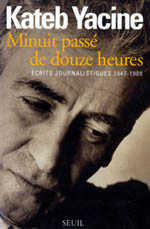 Minuit passé de douze heures. Écrits journalistiques 1947-1989.RecueilTextes réunis par Amazigh Kateb.Kateb Yacine est lié(e) à ce livre en tant que dramaturge
Minuit passé de douze heures. Écrits journalistiques 1947-1989.RecueilTextes réunis par Amazigh Kateb.Kateb Yacine est lié(e) à ce livre en tant que dramaturge -
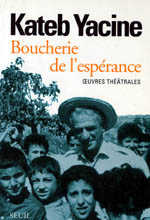 Boucherie de l’espéranceThéâtreRecueil de 4 pièces de théâtre : « Mohamed prends ta valise » « La guerre de 2000 ans ou Palestine trahie » « La guerre de 2000 ans ou le roi de l’Ouest » « Le bourgeois sans culotte » Textes établis et traduits…Kateb Yacine est lié(e) à ce livre en tant que dramaturge
Boucherie de l’espéranceThéâtreRecueil de 4 pièces de théâtre : « Mohamed prends ta valise » « La guerre de 2000 ans ou Palestine trahie » « La guerre de 2000 ans ou le roi de l’Ouest » « Le bourgeois sans culotte » Textes établis et traduits…Kateb Yacine est lié(e) à ce livre en tant que dramaturge
Partager :



